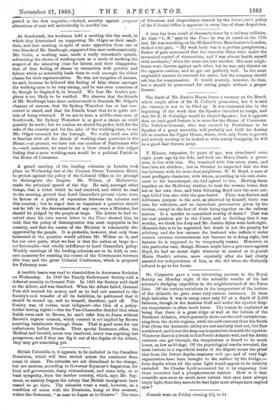At Southwark, the workmen held a meeting this day week,
in which they determined on supporting Mr. Odger as their candi- date, and that meeting, in spite of some opposition from one or two friends of Mr. Bradlaugh, supported him most enthusiastically. Mr. Guile, a working man, made a really remarkable speech, advocating the choice of working-men as a mode of marking the respect of the labouring class for labour, and their disapproba- tion of that feeling of shame in connection with poverty and labour which so invariably leads them to seek amongst the richer classes for their representatives. He was not sanguine of success, he said, because he believed this feeling of false shame amongst the working-men to be very strong, and he was even conscious of it, though he despised it, in himself. We fear Mr. Guile's pro- phecy is too likely to be verified. We observe that the friends of Mr. Bradlaugh have since endeavoured to diminish Mr. Odger's chances of success, that Sir Sydney Waterlow has at last con- sented to stand, and that his friends boast that he is quite cer- tain of being returned. If we are to have a middle-class man at Southwark, Sir Sydney Waterlow is as good a choice as could possibly be made; but we confess we should far prefer, both for the sake of the country and for the sake of the working-class, to see Mr. Odger returned for the borough. We really need one who is familiar with all the details of working-class questions in the House,—at present, we have not one member of Parliament who is,—and, moreover, we want to see a blow struck at this vulgar feeling that a mere working-man would be a political Pariah in the House of Commons.


































 Previous page
Previous page